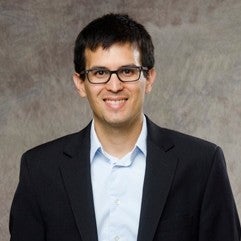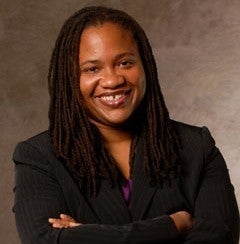Two Denver Law Professors Receive Fulbright Awards
César Cuauhtémoc García Hernández and Robin Walker Sterling will conduct research in Slovenia, Ghana
César Cuauhtémoc García Hernández and Robin Walker Sterling, both professors at the Sturm College of Law, have received Fulbright Awards for the 2017-2018 academic year. “For roughly 70 years, the Fulbright Scholarship Program has recognized truly outstanding faculty members whose research enhances understanding between the United States and foreign nations,” says Bruce Smith, dean of the Sturm College. “I am exceptionally proud of our two recipients,” he adds. “Their areas of expertise – immigration law and juvenile justice, respectively – bear on fundamental matters of international concern, and their work carries on in the grand tradition of Senator Fulbright, himself a lawyer and law professor.”
García Hernández, assistant professor, will begin his research in Slovenia in the spring of 2018, examining immigration imprisonment. “Specifically, I will be performing a comparative study of immigration imprisonment in Slovenia and the United States,” he explains. While the United States confines upwards of half a million people annually due to migration-related violations, Slovenia has traditionally taken a different path. However, Slovenia has been impacted by large-scale migration in recent years and in response, Slovenian authorities have increasingly relied on confinement.
“As a scholar with a deep background in the United States’ use of confinement to regulate migration, my objective is to understand how migratory patterns and political dynamics interact with legal norms to produce a reliance on confinement as a means of enforcing laws regulating migration,” says García Hernández.
Walker Sterling, associate professor, will be conducting her research at the University of Ghana School of Law in Legon, Ghana. She will be examining how recent advancements in our understanding of adolescent brain development have affected the juvenile justice systems in Ghana and the United States. “I am keenly interested in how acknowledgments of the limitations of youth brain development are manifested both in legislative policies and in courtroom practice,” she says.
Walker Sterling will also be teaching a course based on her research findings. “The course will aim to help law students understand the implications and limitations of these exciting findings; imagine ways to raise these findings in workaday juvenile proceedings like bail and sentencing arguments; and craft arguments and motions that inject these findings into the proceedings in a way that capitalizes on the juvenile system’s potential as a place for restorative and rehabilitative justice,” she explains.









